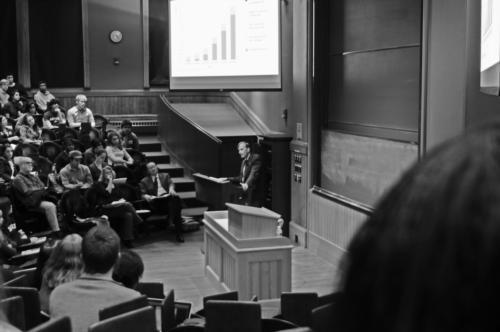
News
Pro-Palestine Encampment Represents First Major Test for Harvard President Alan Garber

News
Israeli PM Benjamin Netanyahu Condemns Antisemitism at U.S. Colleges Amid Encampment at Harvard

News
‘A Joke’: Nikole Hannah-Jones Says Harvard Should Spend More on Legacy of Slavery Initiative

News
Massachusetts ACLU Demands Harvard Reinstate PSC in Letter

News
LIVE UPDATES: Pro-Palestine Protesters Begin Encampment in Harvard Yard
Funds, Partnership Keys to AIDS Battle, Official Says

The expansion of monetary funds from the government and global cooperation for HIV/AIDS prevention are the two key steps needed in the global fight against AIDS, U.S. Global AIDS Coordinator Mark R. Dybul told an audience of over 100 in Sever Hall last night.
Dybul’s presentation centered largely on the vision, goal, and results of the President’s Emergency Plan for AIDS Relief (PEPFAR), an initiative launched by President Bush in 2003 to combat the global epidemic.
Dybul, a former ambassador to Switzerland who currently leads PEPFAR, gave a detailed explanation of American AIDS relief policy for sub-Saharan Africa.
“We are doing our parts,” said Dybul, who is also a doctor. “I am not saying this in pride, but rather in a slight disgust. The rest of the world is not responding.”
He pointed out that Americans are providing 55 percent of global resources to fight the fatal disease, which he called one of the greatest threats to modern society.
In a detailed introduction of PEPFAR, he described the methodology and the results of the program as efficient and successful.
“PEPFAR is a bilateral and multilateral program,” he said. “We distribute most of our budget to 15 ‘focus’ countries, which consist of more than 50 percent of the entire infected population.”
Dybul also outlined the work that PEPFAR does with UNAIDS, the World Health Organization, UNICEF, United Nations World Food Programme, and other international organizations.
He called PEPFAR’s long-term aims aggressive yet promising, describing its “2-7-10 goals: prevention of seven million new HIV infections, annual treatment of two million HIV-infected people, annual care for 10 million infected with and affected by HIV/AIDS, concentrating on orphans and vulnerable children.”
Dybul said that 7 million preventions would represent more than 60 percent of current annual HIV infections, but PEPFAR is slowly approaching this target.
“What is important is not the numbers but the fundamental goal that people must stay alive,” he said. “In Botswana, thanks to the initiation of government spending and international help, the life expectancy of infant population increased at a rate of five years per every year since 2003.”
According to his data, the life expectancy in Botswana grew from 49 years in the 2004 fiscal year to 63 years this year.
Dybul concluded that intense international collaboration and a sustained, globalized vision that AIDS can be overcome are essential to the battle.
The event, sponsored by the Harvard Global Health and AIDS Coalition and the “Anthropology 1825 Speaker Series,” was held in conjunction with World AIDS Day, which was observed Monday.
Want to keep up with breaking news? Subscribe to our email newsletter.
